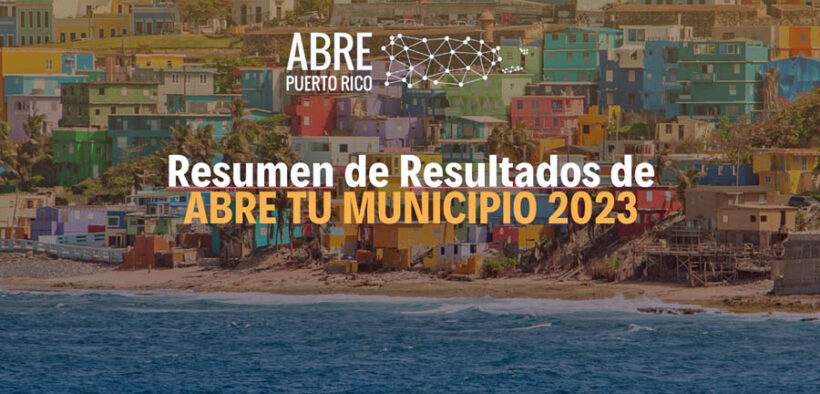Why Puerto Rico can’t afford 78 municipalities anymore

The latest Fiscal Health Index by ABRE Puerto Rico presents a sobering yet hopeful snapshot of the financial condition of the island’s 78 municipalities.
While progress is evident — with fewer municipalities running deficits and slight improvements in general fund balances — the reality remains harsh: 26 municipalities teeter on the brink of crisis, their fragile finances vulnerable to any natural disaster or administrative misstep that could push them into insolvency.
For Puerto Rico’s sustainability and the well-being of its citizens, difficult decisions must be made now — beginning with a fundamental reconsideration of the island’s municipal structure and public sector framework.
It is critical to stress that producing the ABRE Fiscal Health report annually without implementing fundamental reforms is nonsensical. Measuring fiscal health repeatedly means little if we do not administer the antidote the data exposes.
Without concrete changes — consolidating municipalities, rightsizing government, and pension reform — the report risks becoming a repetitive chronicle of decline rather than a catalyst for transformation.
Puerto Rico’s population has shrunk about 15% since 2000, but the impact varies widely. Take Guánica, for example, a southern coastal municipality that has experienced a population decline exceeding 40%. Guánica’s fiscal distress exemplifies many small municipalities struggling to provide basic services.
According to its latest audit, 65% of Guánica’s budget goes to general administration, leaving only a fraction for critical public safety, health, and infrastructure needs. Long-term liabilities exceed $1,100 per resident; its general fund holds a negative balance; and several financial statements have been deemed unreliable. Such municipalities are effectively insolvent in their service capacity — barely covering bills while failing residents’ expectations amid shrinking revenues.
This is the challenge facing nearly a third of Puerto Rico’s municipalities. Federal aid, like the American Rescue Plan’s one-time $1.5 billion boost, has offered temporary relief but fails to address structural deficits.
Consolidation is not merely a recommendation — it is an imperative. Maintaining 78 separate municipalities, each with its own mayor, legislature, and bureaucracy, imposes excessive overhead and diffuses resources ill-suited to current realities.
Merging municipalities or creating regional authorities for service delivery can preserve local culture and representation while eliminating redundancy, achieving economies of scale, and significantly reducing administrative burdens.
Savings from consolidations extend beyond staffing; public sector employment remains the island’s largest workforce segment, exerting disproportionate pressure on government finances.
In parallel, rightsizing governance by reducing the number of senators and representatives through constitutional amendments is long overdue.
While precise financial savings require formal study, simplification of government roles and fewer elected officials would free essential resources for front-line services rather than administrative upkeep.
The solution demands modernization rooted in lean startup principles, a proven approach to combat inefficiency and waste. Policies and programs should be continuously tested, outcomes measured, and reforms iterated — leveraging technology and AI efficiencies — to sunset outdated roles and failed projects.
Fiscal responsibility must become a societal mindset, ingrained from agency heads to frontline staff, anchored by the ethical necessity of balanced budgets.
A critical component of Puerto Rico’s fiscal challenges is the severe underfunding of the Employee Retirement System (ERS), which covers public sector workers including teachers, former power authority employees, and government officials. The ERS lacks sufficient funds to cover current and future pension obligations, forcing the government to cover shortfalls despite limited financial means.
For example, PREPA’s ERS was depleted by late 2024 and required urgent bridge funding exceeding $146 million in 2025 to make pension payments. This has led the government to rely on temporary budget increases and stopgap funding, straining public resources and diverting funds from essential services.
Without fundamental reforms to address the ERS deficit, Puerto Rico’s fiscal crisis will worsen as pension obligations crowd out government priorities.
This should not diminish the dedication of many mayors and municipal employees working tirelessly under difficult conditions. Their good intentions often clash with the brutal realities of the 21st century — natural disasters, demographic shifts, and rapid technological change. Precisely why strategic municipal redistribution — potentially consolidating into fewer municipalities layered with districts — is essential.
This approach would honor cultural identity and history while reforming administrative excess for long-term viability.
Beyond governance reform, Puerto Rico must rethink its economic value proposition. Tourism and resorts alone cannot sustain the island’s future. Embracing new sectors — STEM careers, technology, and innovation-driven industries — and aligning public policy and investment accordingly can foster sustainable growth and quality job creation.
Finally, Puerto Rico’s political class must abandon short-term fixes and empty promises that undermine fiscal stability. Ethical governance demands transparency, balanced budgets, and shared societal responsibility. Public sector employees must internalize fiscal health as a core duty — essential to preserving the island’s social fabric and future prosperity.
Puerto Rico stands at a crossroads. The transparency and data from ABRE Puerto Rico’s Fiscal Health Index illuminate both the risks and pathways forward. Through municipal consolidation, lean governance, fiscal responsibility, and strategic economic realignment, Puerto Rico can build a government that is efficient, accountable, and prepared for the future. This is the challenge — and the opportunity — before us all.

Antonio Santos is a hospitality, service and tourism professional with more than 30 years of industry experience. In 2024, he ran for the Puerto Rico House of Representatives, representing District 1 in San Juan under the Proyecto Dignidad party. A supporter of entrepreneurship and small government, Santos promotes economic development based on independence, efficiency and sustainable growth.




